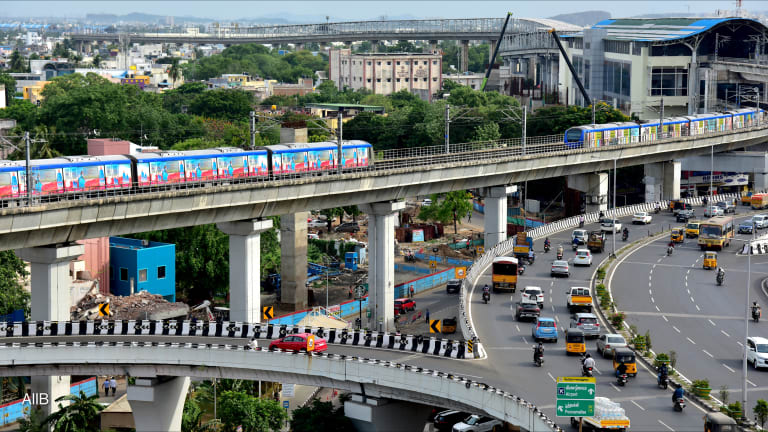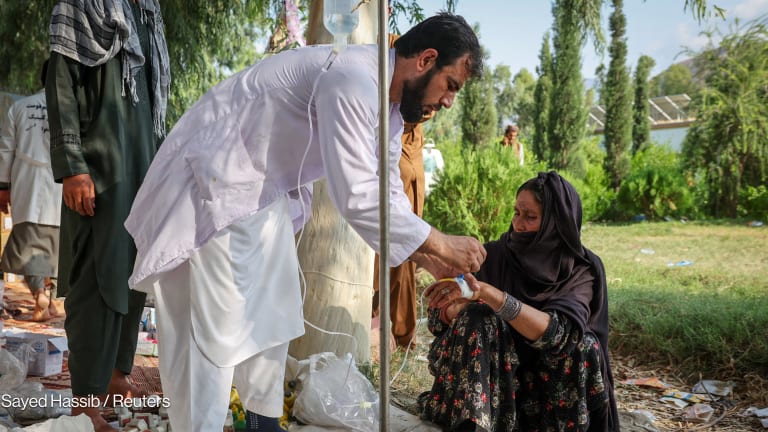
CANBERRA — The Sunda Strait tsunami in Indonesia on Dec. 22 killed more than 400 people and injured over 7,000. It was a devastating end to 2018 for Indonesia, which faced a range of disasters: earthquakes on the island of Lombok in July and August, an earthquake and tsunami impacting the island of Sulawesi in September, and the Lion Air crash in October.
“One of the things we do need to do better, is explain how our long term development work actually does build resilience.”
— Claire Rogers, CEO of World Vision AustraliaDespite the loss caused by the Sunda Strait tsunami, there has been no request for international support from the Indonesian government. Existing resources and longstanding partnerships with NGOs operating within Indonesia have been deemed sufficient to support the immediate and long-term response. Compared to the Sulawesi disaster, the Sunda Strait tsunami is about a sixth of the scale of destruction and is easier to respond to due to its close proximity to the capital city of Jakarta.
But there are still affected communities whose lives have been impacted, including those on the islands of Sebuku and Sebesi, who were evacuated and yet to return home.
Devex spoke with two NGOs given approval by the Indonesian government to help rebuild: the International Federation of Red Cross and Red Crescent Societies and World Vision. They shared insight into the response as well as how they are combatting donor fatigue to maintain awareness of the ongoing support needed throughout the Pacific.
The Sunda Strait response
Wahana Visi Indonesia, the Indonesian arm of World Vision, and IFRC are among the locally based NGOs supporting the response to the tsunami. Both have supported responses to the Lombok earthquake and Sulawesi tsunami as well.
“We are on the ground with a very large operation in Indonesia — Wahana Visi Indonesia, and they have been there for a long time,” said Claire Rogers, CEO of World Vision Australia, explaining to Devex that the relationship has existed since the 2004 tsunami.
“Wahana Visi Indonesia has been able to deploy very quickly into the region ... The big difference is when organizations are not on the ground and the Indonesian government needs to choose who they want to come in and partner with them. The larger the scale of the emergency, the more likely the government is to request that international help. But we are able to just get going,” Rogers said.
Could we deliver aid before a disaster strikes?
When floods strike in Bangladesh, the international community employs a costly emergency response — but what if that could be avoided? Devex explores the rise of forecast-based financing.
The current response involves providing health assistance, psychosocial support, intervention and child protection, family kits, water and sanitation, and aid. Over time it is anticipated that support from World Vision International will include the rebuilding of schools and homes as well as other livelihood support, so people can go back to earning an income.
The Indonesian Red Cross is similarly working on the immediate response, said Rosemarie North, Asia Pacific communications manager at IFRC: “The focus is still on the emergency help, especially for people still in evacuation centers … There are people who came off islands who still cannot return home. It is not clear when they are going to return home.” she said.
IFRC is working with Indonesian authorities to determine the next steps required.
Fundraising to support the Sunda Strait communities
Despite no call for international support, there has been a limited need for financial support.
“Local resources can cope,” North said. “It was a tsunami, and not an earthquake or landslide … so we can accept that buildings are much stronger.”
World Vision International has an appeal to support the work of Wahana Visi Indonesia, with a current target of $3 million.
“We will review this periodically,” Rogers said. “At the moment that $3 million is for the next nine months for the direct and urgent need from the tsunami.”
But cascading disasters mean organizations such as World Vision have to convince donors of the need for preparedness.
“What we’re building into our commentary here for donors to understand is that when there is a crisis on top of a crisis,” she said.
“So we are being very transparent with donors that this is a cumulative and continuous challenge for Indonesia. We have donors that give specifically to an emergency fund with us and that essentially goes to the area most in need. For this particular emergency that is what we are drawing upon,” Rogers said.
While IFRC is not currently raising funds for the Sunda Strait tsunami, it is still raising funds for responses to the Lombok earthquake and Sulawesi tsunami. North said it was becoming hard to raise the funds required with the recent tsunamis overshadowing the earthquake.
“The Lombok earthquake was July 29 and at the end of January it will be six months,” she said. “We’ll be thinking about ways to promote that and bring some attention back.”
The 'secret' to JICA's disaster risk reduction
Countries around the world look to Japan as a leader in reducing the risks of disaster. Here's what JICA experts have to say about the agency's approach.
Communication strategies and engagement of the media are important to help broaden donors thinking from reactionary to proactive. But Rogers said the magnitude, impact, and challenge of a disaster response needs to be taken into consideration when determining the public engagement and calls for donations.
“It needs to be a response to each situation. Obviously, any impact of this nature is tragic, however, our assessment — and you can see in the Indonesian government assessment — is that they can manage this situation a lot better. And my view is that you have to use your time with the public carefully.”
Despite there being less emphasis on the Sunda Strait tsunami, there was ongoing media interest — and North explained that there was strong interest from Canada and Europe in particular. And innovative strategies such as the use of drone footage to show the after-effects of the tsunami were helping to communicate the dramatic impacts of tsunamis in the Pacific.
Changing the conversation from response to preparedness
The unpredictable nature of many disasters in an era of climate change makes the investment in community resilience and building local capacity by donors and partners critical to saving lives and livelihoods.
“One of the things we do need to do better, is explain how our long term development work actually does build resilience,” Rogers said, explaining that preparedness is where both lives and money is saved.
Rogers shared the story of a Wahana Visi Indonesia staff member who was in the Sunda Strait village just before the tsunami hit. Understanding the signs — a higher sea level, garbage in the water, ocean rumblings, and an odd vibration — resulted in her and her family leaving the restaurant 10 minutes before the tsunami hit and the restaurant was destroyed.
“What her story is telling us is that she had the education and knowledge to be able to recognize the signs and take action to protect her and her family,” Rogers said.
Search for articles
Most Read
- 1
- 2
- 3
- 4
- 5








